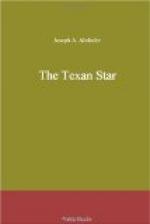Ned, too, now smelt the strong odor of smoke, and a spurt of fire appeared at a crack between two of the planks at the far end of the place. The struggles of the horses increased. They were wild with fright.
Ned instantly recognized the danger. The burning wooden building would fill the stone convent itself with flame and smoke, and make it untenable. The sparks already had become many, and the odor of smoke was increasing. Their situation, suddenly become desperate, was growing more so every instant. But they were Texans, inured to every kind of danger. Bowie shouted for more men to come from the convent, leaving only five or six on guard there.
Then the Texans began to bring method and procedure out of the turmoil. Some held the horses, others, led by Bowie, kicked loose the light planks where the fire had been started, and hurled them outward. They were nearly choked by the smoke but they worked on.
The Comanches, many of whom were hugging the wall, shouted their war cry, and began to fire into the opening that Bowie and his men had made. They could not take much aim, because of the smoke, but their bullets wounded two Texans. Despite the danger Bowie and most of his men were still compelled to work at the fire. The room was full of smoke, and behind them the horses were yet struggling with those who held them.
The Ring Tailed Panther lay down and resting himself on one elbow took aim with his rifle. He was almost clear of the smoke which hung in a bank above him. Ned noticed him and imitated him. He saw a dusky figure outside and when he fired it fell. The Ring Tailed Panther did as well, and Obed joined them. While Bowie and the others were dashing out the fire, three great marksmen were driving back the Comanches who sought to take advantage of the diversion.
“Good! good!” cried Bowie, as they knocked out the last burning plank.
“That ends the fire,” said Obed, “and now we’ve got a hole here which is not so deep as a well, nor so wide as a barn door, but I do not think it will suffice for our friends, the Comanches.”
All the men turned their attention to the enemy, and, lying on the ground, they took as good aim as the darkness would permit. The Texan rifles cracked fast and, despite the darkness, the bullets often found the chosen targets. The Comanches had been shouting the war whoop continuously, but now their cries began to die, and their fire died with it. Never a very good marksman, the Indian was no match for the Texans, every one of whom was a sharpshooter, armed with a fine rifle of long range.
The Texans also fired from the shelter of the building, and, as the great cloud was now parting, letting through shafts from the moon, the Comanches were unable to find good hiding in the weeds and grass. The bullets pursued them there. No matter how low they lay the keen eye of some Texan searched them out, and sent in the fatal or wounding bullet. Soon they were driven to the shelter of the adobe wall, where they lay, and for a little while returned a scattering fire which did no harm. After it ceased no Comanche uttered a war whoop and there was silence again, save for the rain which now trickled down softly.




